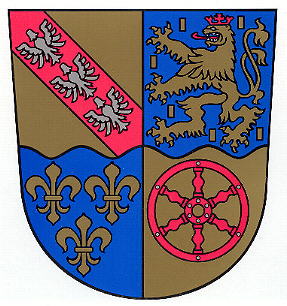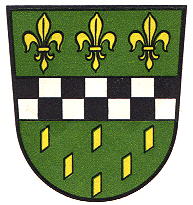Überherrn: Difference between revisions
Knorrepoes (talk | contribs) No edit summary |
Knorrepoes (talk | contribs) m (Text replacement - "↵↵'''" to "'''") |
||
| (23 intermediate revisions by the same user not shown) | |||
| Line 1: | Line 1: | ||
'''ÜBERHERRN''' | '''ÜBERHERRN''' | ||
State : [[Saarland]]<br/> | State : [[Saarland]]<br/> | ||
District (Kreis) : [[Saarlouis (kreis)|Saarlouis]]<br/> | District (Kreis) : [[Saarlouis (kreis)|Saarlouis]]<br/> | ||
Additions : Altforweiler, Berus, Bisten, Felsberg, Wohnstadt | Additions : 1974 [[Altforweiler]], [[Amt Bisten]], [[Berus]], [[Bisten]], [[Felsberg (Saar)|Felsberg]], Wohnstadt | ||
[[File:uberherrn.jpg|center]] | [[File:uberherrn.jpg|center|alt=Wappen von {{PAGENAME}}/Arms (crest) of {{PAGENAME}}]] | ||
= | {| class="wikitable" | ||
|+Official blazon | |||
|- | |||
|'''German''' | |||
| | |||
* (1964) In Grün ein von Schwarz und Silber in zwei Reihen geschachter Balken, begleitet oben von drei goldenen Lilien und unten von sechs (3 : 2 : 1) goldenen Schindeln. | |||
* (1985) Geviert, Ober- und Unterschild wellenförmig getrennt, in 1 in gold ein mit 3 silbernen Alerions belegter roter Schrägbalken, in 2 in blau belegt mit 6 goldenen Schindeln ein rot gezungter, rot gekrönter doppelschwänziger goldener Löwe, in 3 in blau drei goldene heraldische Lilien, in 4 in gold ein rotes, sechsspeichiges Wagenrad. | |||
|- | |||
|'''English''' | |||
| blazon wanted | |||
|} | |||
===Origin/meaning=== | |||
The arms were granted on July 30, 1985. | The arms were granted on July 30, 1985. | ||
The first three fields symbolise the territories to which the area historically belonged; the first quarter shows the arms of [[Lorraine]] (Lothringen), as Altforweiler, Berus, Bisten and Felsberg belonged to Lorraine until 1766. The second quarter shows the lion of [[Nassau]] as Überherrn belonged to Nassau-Saarbrücken until 1766. The three fleur-de-lis in the third quarter are the French Royal arms and symbolize the fact that the whole area was part of France from 1766-1793. <br> | The first three fields symbolise the territories to which the area historically belonged; the first quarter shows the arms of [[Lorraine]] (Lothringen), as Altforweiler, Berus, Bisten and Felsberg belonged to [[Lorraine]] until 1766. The second quarter shows the lion of [[Nassau]] as Überherrn belonged to Nassau-Saarbrücken until 1766. The three fleur-de-lis in the third quarter are the French Royal arms and symbolize the fact that the whole area was part of France from 1766-1793. <br> | ||
The fourth quarter shows a wheel with 6 spokes for the 6 former municipalities. The wheel also symbolizes traffic, as the municipality is on the border between France and Germany. | The fourth quarter shows a wheel with 6 spokes for the 6 former municipalities. The wheel also symbolizes traffic, as the municipality is on the border between France and Germany. | ||
The wavy division line symbolizes the Bist river. | The wavy division line symbolizes the Bist river. | ||
The previous arms, shown below, were granted | The previous arms, shown below, were granted on Janury 23, 1964 and are not historical. | ||
[[File:uberherr.jpg|center]] | [[File:uberherr.jpg|center]] | ||
No arms or seals are known prior to 1964. The upper part shows the fleur-de-lis of the French Royal arms. They represent the French rule over the city. The lower part shows the rectangles of the arms of [[Nassau]] and represent the time that the village belonged to Nassau-Saarbrücken. The chequered fess symbolises the importance of the village as a railway crossroads. The colours of the 'railway' are the colours of Prussia, to which the village belonged since 1815. | No arms or seals are known prior to 1964. The upper part shows the fleur-de-lis of the French Royal arms. They represent the French rule over the city. The lower part shows the rectangles of the arms of [[Nassau]] and represent the time that the village belonged to Nassau-Saarbrücken. The chequered fess symbolises the importance of the village as a railway crossroads. The colours of the 'railway' are the colours of Prussia, to which the village belonged since 1815. | ||
[[Literature]] : Stadler, 1964-1971, 8 volumes; new arms and image obtained from the Überherrn council. | |||
{{de}} | |||
{{media}} | |||
[[Civic Heraldry Literature - Germany|'''Literature''']]: Stadler, 1964-1971, 8 volumes; new arms and image obtained from the Überherrn council. | |||
[[Category:German Municipalities U|Uberherrn]] | [[Category:German Municipalities U|Uberherrn]] | ||
Latest revision as of 12:56, 29 January 2024
ÜBERHERRN
State : Saarland
District (Kreis) : Saarlouis
Additions : 1974 Altforweiler, Amt Bisten, Berus, Bisten, Felsberg, Wohnstadt
| German |
|
| English | blazon wanted |
Origin/meaning
The arms were granted on July 30, 1985.
The first three fields symbolise the territories to which the area historically belonged; the first quarter shows the arms of Lorraine (Lothringen), as Altforweiler, Berus, Bisten and Felsberg belonged to Lorraine until 1766. The second quarter shows the lion of Nassau as Überherrn belonged to Nassau-Saarbrücken until 1766. The three fleur-de-lis in the third quarter are the French Royal arms and symbolize the fact that the whole area was part of France from 1766-1793.
The fourth quarter shows a wheel with 6 spokes for the 6 former municipalities. The wheel also symbolizes traffic, as the municipality is on the border between France and Germany.
The wavy division line symbolizes the Bist river.
The previous arms, shown below, were granted on Janury 23, 1964 and are not historical.
No arms or seals are known prior to 1964. The upper part shows the fleur-de-lis of the French Royal arms. They represent the French rule over the city. The lower part shows the rectangles of the arms of Nassau and represent the time that the village belonged to Nassau-Saarbrücken. The chequered fess symbolises the importance of the village as a railway crossroads. The colours of the 'railway' are the colours of Prussia, to which the village belonged since 1815.
This page is part of the German heraldry portal Deutsche Wappensammlung |
Heraldry of the World |
|
German heraldry:
|
Selected collector's items from Germany:
|
Contact and Support
Partners:
Your logo here ?
Contact us
© since 1995, Heraldry of the World, Ralf Hartemink 
Index of the site
Literature: Stadler, 1964-1971, 8 volumes; new arms and image obtained from the Überherrn council.













